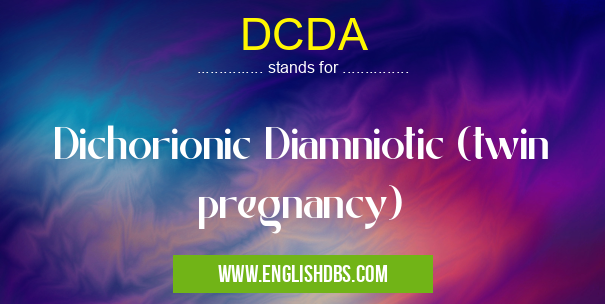What does DCDA mean in CLINICAL MEDICINE
DCDA stands for Dichorionic Diamniotic, a term used in the medical field to describe a type of twin pregnancy. In a DCDA pregnancy, the twins develop in separate amniotic sacs and have their own separate chorions (the outermost fetal membrane). This type of twin pregnancy is the most common, accounting for approximately 70% of all twin pregnancies.

DCDA meaning in Clinical Medicine in Medical
DCDA mostly used in an acronym Clinical Medicine in Category Medical that means Dichorionic Diamniotic (twin pregnancy)
Shorthand: DCDA,
Full Form: Dichorionic Diamniotic (twin pregnancy)
For more information of "Dichorionic Diamniotic (twin pregnancy)", see the section below.
Key Characteristics of DCDA
- Separate Amniotic Sacs: Each twin has its own amniotic sac, which is filled with amniotic fluid. This fluid provides a protective environment for the developing fetus and allows them to move freely.
- Separate Chorions: The chorion is the outermost fetal membrane that surrounds the amniotic sac. In a DCDA pregnancy, each twin has its own chorion, which means they are not connected to each other.
- Independent Development: The twins in a DCDA pregnancy develop independently of each other. They have their own placentas and umbilical cords, and they can have different genetic profiles.
Risk Factors Associated with DCDA
While most DCDA pregnancies are uncomplicated, there are some potential risks associated with this type of twin pregnancy, including:
- Preterm Birth: DCDA twins are more likely to be born prematurely compared to singleton pregnancies.
- Low Birth Weight: DCDA twins may also have a lower birth weight compared to singleton babies.
- Twin-to-Twin Transfusion Syndrome (TTTS): This is a rare but serious condition that can occur in DCDA pregnancies, where one twin receives too much blood flow from the other twin.
- Preeclampsia: This is a pregnancy complication characterized by high blood pressure and protein in the urine. It is more common in DCDA pregnancies compared to singleton pregnancies.
Essential Questions and Answers on Dichorionic Diamniotic (twin pregnancy) in "MEDICAL»CLINICAL"
What does DCDA mean?
DCDA stands for Dichorionic Diamniotic, which refers to a twin pregnancy where each twin has their own placenta and amniotic sac.
How common is a DCDA twin pregnancy?
DCDA pregnancies account for approximately 70-80% of twin pregnancies.
What causes a DCDA twin pregnancy?
DCDA pregnancies occur when two fertilized eggs implant separately into the uterus. This can happen when two separate eggs are released from the ovaries or when a single fertilized egg splits into two after fertilization.
Are DCDA twin pregnancies higher risk than other twin pregnancies?
DCDA pregnancies are generally considered to be lower risk than monochorionic pregnancies (where the twins share the same placenta). However, they still carry a higher risk of certain complications compared to singleton pregnancies, such as premature birth, low birth weight, and twin-to-twin transfusion syndrome.
What are the potential complications of a DCDA twin pregnancy?
Potential complications of a DCDA twin pregnancy include:
- Premature birth
- Low birth weight
- Twin-to-twin transfusion syndrome
- Placental abruption
- Intrauterine growth restriction
- Gestational diabetes
- Preeclampsia
How are DCDA twin pregnancies managed?
DCDA twin pregnancies require close monitoring throughout the pregnancy. This may include regular prenatal check-ups, ultrasounds, and blood tests. Depending on the individual circumstances of the pregnancy, additional interventions may be necessary, such as:
- Bed rest
- Medication to prevent premature labor
- Delivery by Cesarean section
What is the prognosis for a DCDA twin pregnancy?
The prognosis for a DCDA twin pregnancy is generally good. With proper prenatal care and management, most DCDA twins are born healthy and have normal outcomes.
Final Words: DCDA is a common type of twin pregnancy in which the twins develop in separate amniotic sacs and have their own separate chorions. While most DCDA pregnancies are uncomplicated, there are some potential risks associated with this type of twin pregnancy that should be discussed with a healthcare provider. Regular prenatal care and monitoring are essential for ensuring a healthy outcome for both the twins and the mother.
